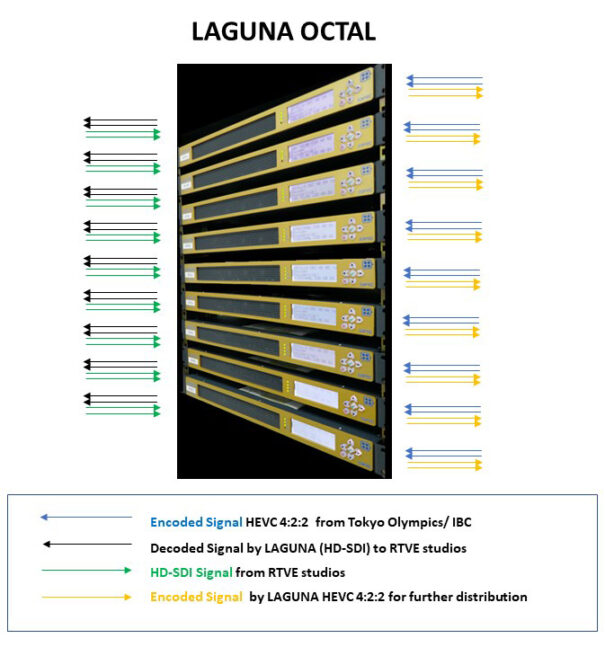RTVE relies on Sapec’s Laguna Octal for Tokyo 2020 signal reception
Sapec has supplied Spanish public broadcaster RTVE with nine Laguna Octal units, which are receiving up to 18 signals from Tokyo 2020.
Sapec’s Laguna Octal is responsible for receiving a total of 36 signals from Japan and forwarding them in parallel to the different RTVE transmission centers. These 36 signals are divided into 18 signals encoded in HEVC/H.264 4:2:2, which arrive from the International Broadcast Center established in Tokyo to Madrid; and 18 signals that will be distributed from RTVE. Thus, Sapec’s nine Laguna Octal units offer 18 encoders and 18 HEVC/H.264 decoders working simultaneously.
To manage the inputs and outputs of the 36 signals, Laguna Octal offers per unit, eight HD-BNC interfaces (configurable as ASI or SDI) and four 1Gb Ethernet interfaces, allowing to establish redundancy and simultaneity of paths in both ASI and IP. In parallel, the solution, compatible with hot-swappable redundant power supplies, offers the processing of four audio PIDs per video signal (4×36), with the possibility of upgrading to eight audio PIDs per video signal (8×36).
 Future-proof
Future-proof
The Laguna Octal supplied by Sapec will allow RTVE to tackle new processes in the future thanks to some of the latest developments of the platform. Therefore, the public corporation will be able to use the Laguna to transmit content with SRT over public IP networks, perform SCTE 104-SCTE35 conversions for local content insertion management, or perform up/down conversions between SD and HD.
Another key feature of Laguna is its flexibility in modifying its internal architecture. This means that these Laguna Octal units, which today have a layout of two HEVC encoders and two HEVC decoders per unit, will be able to adapt to future needs within their capabilities. In this way, what today are two encoders and two HEVC/H.264 encoders can be converted via software into up to eight H.264 encoders, up to four HEVC encoders or eight HEVC/H.264/MPEG-2 decoders, among other options.
¿Te gustó este artículo?
Suscríbete a nuestro RSS feed y no te perderás nada.
















